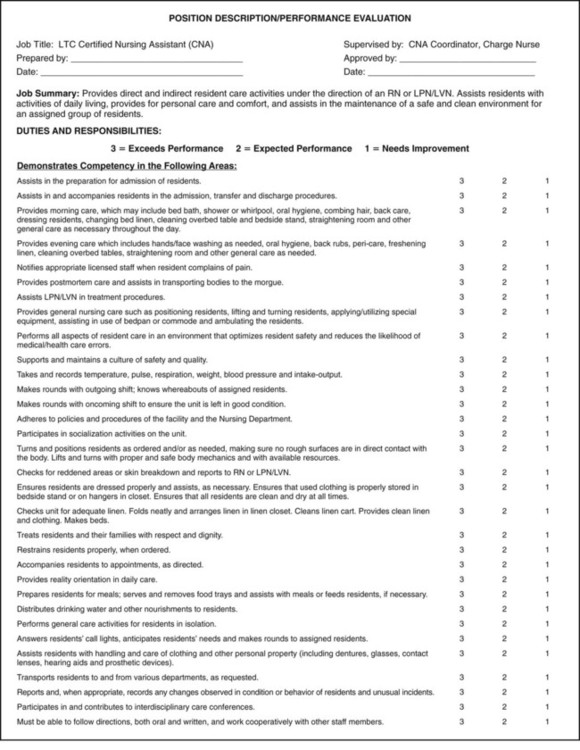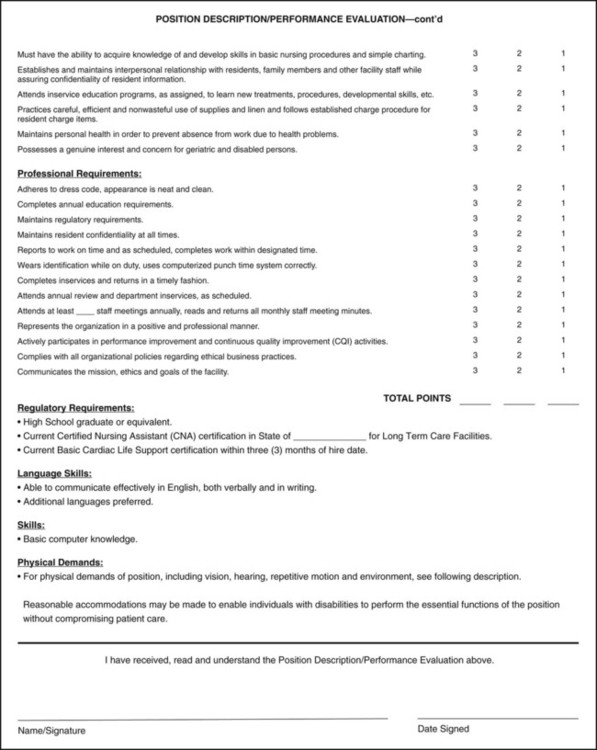HIPAA Health Insurance Portability and Accountability Act of 1996 NATCEP Nursing assistant training and competency evaluation program NCSBN National Council of State Boards of Nursing OBRA Omnibus Budget Reconciliation Act of 1987 • Define the key terms and key abbreviations listed in this chapter. • List the reasons for denying, suspending, or revoking a nursing assistant’s certification, license, or registration. • Describe the training and competency evaluation requirements for nursing assistants. • Identify the information in the nursing assistant registry. • Describe what nursing assistants can do and their role limits. • Describe the standards for nursing assistants developed by the National Council of State Boards of Nursing. • Explain why a job description is important. • Describe the delegation process and your role. • Explain how to accept or refuse a delegated task. • Give examples of intentional and unintentional torts. • Explain how to protect the right to privacy. • Explain the importance of informed consent. • Explain how to promote PRIDE in the person, the family, and yourself. Each state has a nurse practice act. A nurse practice act: • Defines RN and LPN/LVN and their scope of practice. • Describes education and licensing requirements for RNs and LPNs/LVNs. • Protects the public from persons practicing nursing without a license. Persons who do not meet the state’s requirements cannot perform nursing functions. • Full name, including maiden name and any married names. • Registry number and the date it expires. • Last known employer, date hired, and date employment ended. • Date the competency evaluation was passed. • Information about findings of abuse, neglect, or dishonest use of property. It includes the nature of the offense and supporting evidence. If a hearing was held, the date and its outcome are included. The person has the right to include a statement disputing the finding. All information stays in the registry for at least 5 years. After successfully completing your state’s NATCEP, you have the title used in your state. • Certified nursing assistant (CNA) or certified nurse aide (CNA). CNA is used in most states. • Licensed nursing assistant (LNA). • Registered nurse aide (RNA). Nursing assistants can have their certifications (licenses, registrations) denied, revoked, or suspended. See Box 3-1 for the reasons listed by the National Council of State Boards of Nursing (NCSBN). To work in another state, you must meet that state’s NATCEP requirements. Licensed nurses supervise your work. You perform nursing tasks related to the person’s care. A nursing task is the nursing care or a nursing function, procedure, activity, or work that can be delegated to nursing assistants when it does not require an RN’s professional knowledge or judgment. Often you function without a nurse in the room. At other times you help nurses give care. The rules in Box 3-2 will help you understand your role. • Your state allows nursing assistants to do so. • It is in your job description. • You have the necessary education and training. • A nurse is available to answer questions and to supervise you. Box 3-3 describes the limits of your role—the tasks that you should never do. State laws differ. Know what you can do in the state in which you are working. The job description is a document that describes what the agency expects you to do (Fig. 3-1, pp. 20–21). It also states educational requirements. Clearly understand what is expected before taking a job. Do not take a job that requires you to: When assessing the person’s needs, the nurse answers these questions. • What is the nature of the person’s needs? How complex are they? How can they vary? How urgent are the care needs? • What are the most important long-term needs? What are the most important short-term needs? • How much judgment is needed to meet the person’s needs and give care? • How predictable is the person’s health status? How does the person respond to health care? • What problems might arise from the nursing task? How severe might they be? • What actions are needed if a problem arises? How complex are those actions? • What emergencies or incidents might arise? How likely might they occur? • How involved is the person in health care decisions? How involved is the family? • How will delegating the nursing task help the person? What are the risks to the person?
The Nursing Assistant
Key Abbreviations
Nurse Practice Acts
The Omnibus Budget Reconciliation Act of 1987
Nursing Assistant Registry
Certification.
Roles and Responsibilities
Job Description


Delegation
Delegation Process
Step 1—Assess and Plan.
![]()
Stay updated, free articles. Join our Telegram channel

Full access? Get Clinical Tree


The Nursing Assistant
Get Clinical Tree app for offline access
